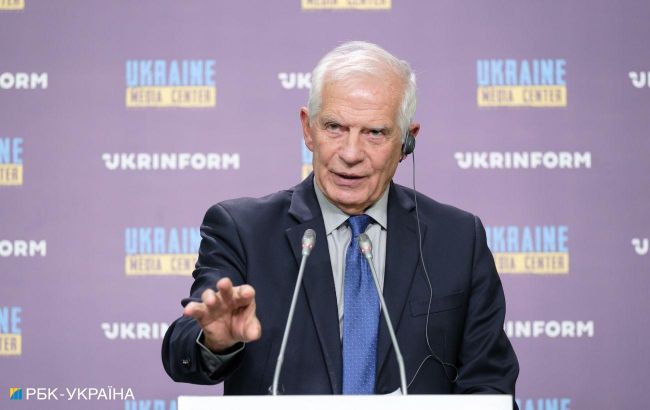Borrell supports joint bonds for EU defense against Russia
 Josep Borrell (Vitalii Nosach, RBC-Ukraine)
Josep Borrell (Vitalii Nosach, RBC-Ukraine)
The European Union is considering issuing conscience bonds to finance defense needs as Russia poses a threat to the bloc's security, according to the High Representative of the EU for Foreign Affairs and Security Policy, Josep Borrell.
Borrell said that debates have recently begun on a joint loan by the EU to cope with the serious efforts needed to invest in defense potential and the defense industry.
"We did it already successfully to deal with the consequences of the COVID-19 pandemic, I do not see why we should not do it when Russia threatens our very security and we urgently need to boost our defence capabilities and our defence industry," he said.
Increase in production capacities
According to him, the war against Ukraine has intensified the issue of increasing the production capacities of the European defense industry.
"To respond to the Russian aggression, we have done what was unthinkable a few years ago – provide weapons, mainly from our existing stocks, to a country at war using the European Peace Facility. But, after two years of a high intensity war, existing stocks are depleted and the conflict has evolved from a war of stocks to a war of production," Borrell added.
He believes that the EU needs to move from an emergency regime to a long-term vision to be able to replenish stocks and develop defense potential needed in the future in a more contentious geopolitical environment while continuing to provide adequate military support to Ukraine.
"The first urgency concerns ammunition production. The industry answered to this emergency by increasing its production capacity by 50% since the start of the war. Which is quite remarkable. Today, in that domain, the constraint is not so much a lack of production capacity, but rather a lack of orders and financing. Industry leaders are clearly telling us: place orders and we will produce moree," Borrell said.
Production fragmentation
However, ammunition production capacities are just part of the problem. The EU needs to do much more to develop this industrial sector. The European defense industry includes various players, from large multinational companies to small and medium-sized enterprises. Geographically, it is highly concentrated: a few member states account for 90% of the entire European defense industry. The annual turnover of this sector is 70 billion euros, and it employs 500,000 people, added the head of EU diplomacy.
What makes this sector unique among all industries is that governments are the sole buyers. In 2022, defense investments by EU member states amounted to 58 billion euros, almost four times less than in the United States. Defense policy remains the exclusive competence of EU member states, and they are the masters of their armies.
"If we want to boost the European defence industry, working with Member States is therefore crucial. We need to invest more, better, together, and European. We have already said that many times before, but this time, we need to do it," he said.
According to him, EU member states still do not coordinate and unite their defense plans and procurements enough. In 2021, joint procurements in Europe accounted for only 18%, despite the target of 35% set by the member states themselves as far back as 2007.
The fragmentation of the European defense industry is associated with the political fragmentation of the continent.
"In Europe, we do not have a Pentagon that concentrates demand and drives the industry. We have to overcome this fragmentation through more cooperation, incentivising more joint procurement of defence capabilities and projects of common European interest," Borrell concluded.
Block strategy
On March 5, the European Commission presented the first-ever European Defense Industrial Strategy at the EU level.
The strategy sets indicators aimed at measuring the progress of member states in ensuring industrial readiness. Member states are proposed to:
- Procure at least 40% of defense equipment by 2030 through cooperation;
- Ensure that by 2030, the value of defense trade within the EU accounts for at least 35% of the EU defense market's value;
- Achieve sustainable progress in ensuring at least 50% of their defense procurement budget within the EU by 2030 and 60% by 2035.
As reported by Bloomberg, some EU capitals are beginning to take seriously the launch of a bloc-wide debt program, as representatives of European security services warn that Vladimir Putin may launch an attack on their territory. At the same time, investors urge EU leaders to make the bloc's bond program for three trillion euros permanent.

